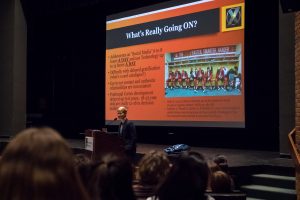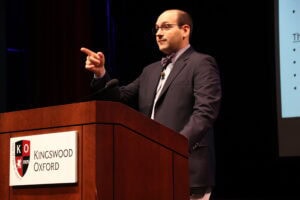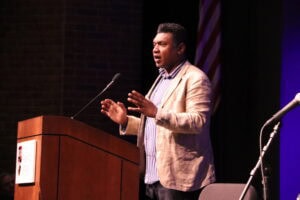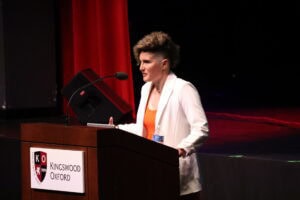Stroud Science Symposium
Science of Today, Technology of Tomorrow
The Stroud Science Symposium brings a leading scientist to campus each year to work with students on topics related to the visitor’s expertise. This experience allows students to access real-world applications, bringing what they learn in class to life. It also highlights how science solves contemporary problems and reinforces the importance of being scientifically well-informed.
Inaugurated in 2000, the Stroud Science Symposium is named in honor of Dixon Stroud, a Kingswood Oxford grandfather and founder of the Stroud Water Research Center of Pennsylvania. The Center is a renowned laboratory dedicated to the research, restoration, and preservation of freshwater habitats.

Visiting Stroud Scientists
-
Tiffany Jones, MD, a sports psychologist consultant who looks at using biofeedback to understand anxiety and manage mentality
-
Caesar Anderson, MD, MPH, ‘92, a plastic surgeon who specializes in the use of hyperbaric treatment for wound care and healing
-
Marshall Barnes, independent researcher, development engineer, and conceptual theorist focusing on time travel
-
Marc Zimmer, Ph.D., a professor at Connecticut College working with GFP (green fluorescent protein) in basic research
-
Ronald L. Mallett, Ph.D., a UConn theoretical physicist who spoke on the possibilities of time travel
-
Theodore Schwartz, M.D., a neurosurgeon who spoke on a variety of topics, including his assertion that there is no link between cell phone use and malignant brain tumors
-
Paul Kurlansky, M.D., ’70, a heart surgeon who spoke about his work in emerging areas of cardiovascular research
-
Gregory Shoukimas, M.D., Ph.D., ’68, a radiologist who spoke about the evolution of medical imaging
-
Peter Hildebrand, Ph.D., chief of the Hydrospheric and Biospheric Laboratory at NASA’s Goddard Space Flight Center, who spoke about climate change
-
Jane Aronson, D.O., a pediatrician, and executive medical director, and founder of Worldwide Orphans Foundation (WWO), who spoke about HIV and AIDS in Ethiopia and HIV-infected orphans
-
Edwin F. Ladd, Ph.D., ’82, a Bucknell University physicist who spoke about the formation of stars and solar systems
-
Robert Thorson, Ph.D., a UConn geologist who addressed the issue of global warming
-
Will Cross ’78, a mountaineer and world explorer who has Type 1 diabetes and who studies the body’s response to extreme physical stress
-
Harlan Halverson, a marine researcher at Woods Hole Oceanographic Institute who lectured on marine fisheries depletion and conservation
-
Ed Stone, Ph.D., California Institute of Technology physics professor, who shared his experiences as a director of the NASA Voyager Project
-
Norman Gershenz, Ph.D., director of the Center for Ecosystem Survival at San Francisco State University, who spoke about preservation
-
Daniel Janzen, Ph.D., University of Pennsylvania, technical advisor to Area de Conservacion Guanacaste, a 250,000-acre preserve in Costa Rica



